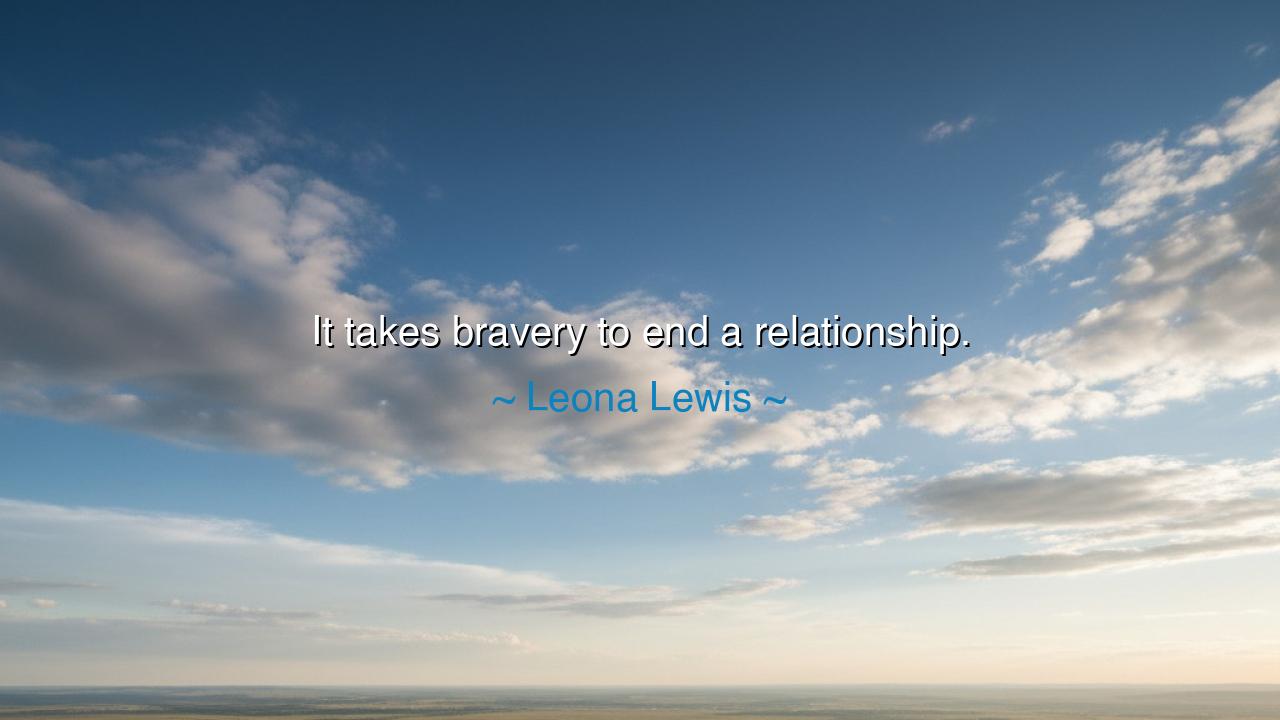
It takes bravery to end a relationship.






In the words of Leona Lewis, whose voice carries both tenderness and strength, we are reminded of a truth often hidden behind sorrow: “It takes bravery to end a relationship.” This is no small statement, for the ending of bonds is among the hardest acts of human life. To bind oneself to another is an act of hope; to unbind is an act of courage. It is to face loneliness, to step into uncertainty, to endure the ache of absence for the sake of truth.
At the heart of her saying is the recognition that bravery is not always found in the grand battles of the world, but in the quiet choices of the heart. Many cling to relationships not out of love, but out of fear: fear of being alone, fear of failure, fear of change. To end what no longer gives life requires strength greater than that of endurance—it requires the strength to let go. Bravery, in this sense, is not the roaring of the lion, but the trembling step into freedom when chains of comfort beg you to stay.
The ancients knew this well. Consider the story of Antigone, who chose to break ties with her own safety and even her betrothed in order to honor what she believed was right. Though her tale is one of tragedy, it shows the essence of Leona Lewis’s words: to end a bond, even one held sacred, requires courage when truth demands it. The hero’s strength is not only in holding fast, but also in knowing when to release.
History, too, gives us many examples. Think of Eleanor Roosevelt, who endured a marriage marked by betrayal. Rather than dissolve in bitterness, she reshaped her life, stepping out of the shadow of dependence into her own destiny as a voice for justice. Her bravery was not only in what she built but in what she chose to let go of—the expectations of silence, the illusion of perfect union. In ending her attachment to those illusions, she became free to live fully.
Lewis’s words also carry a deeper wisdom about truth and integrity. To stay in a relationship that is broken, abusive, or lifeless may seem easier, but it is to deny the soul its rightful freedom. Ending such a bond honors both oneself and the other, for it speaks honestly: “We can no longer walk this road together.” Bravery here is not cruelty, but mercy. It is the act of choosing authenticity over pretense, growth over stagnation.
The lesson for us is clear: do not mistake endurance for courage. Sometimes true courage lies in release. It is noble to fight for love when love can still be saved, but it is equally noble to end a bond when it has become a prison. Life is too brief to be lived in falsehood, too sacred to be bound in chains of fear. Bravery is to face the silence after goodbye, knowing that beyond it lies the possibility of renewal.
Practically, this means listening deeply to the heart. If you remain in a relationship, let it be out of love, not fear. If you leave, let it be out of truth, not pride. Surround yourself with support, for the journey after parting is long, but not without hope. Write, reflect, speak your truth gently but firmly. And above all, remember that endings are not the final word—they are the soil in which new beginnings grow.
So let us remember Leona Lewis’s wisdom: it takes bravery to end a relationship. The world often praises those who stay, but it must also honor those who leave when leaving is right. For in such choices lies not weakness, but the quiet heroism of the soul—the courage to step away from what is broken, and to walk into the unknown in search of what is true.






AAdministratorAdministrator
Welcome, honored guests. Please leave a comment, we will respond soon